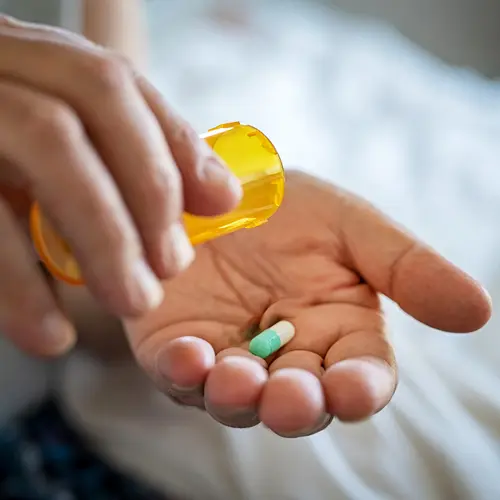What Is Heartburn?
Heartburn is an occasional burning pain in your chest that can get worse after you eat, at night, when you lay down, or bend over. It's a symptom of gastroesophageal reflux disease (GERD).
GERD occurs when the acids in your stomach always come back up into your esophagus, the pipeline between your mouth and stomach.
Heartburn is common and you can usually manage it with a few changes in your lifestyle.
Heartburn Triggers
Food isn't the only thing that causes heartburn. How and when you exercise and what medicines you take, for instance, may also cause heartburn. The key to managing symptoms is to know your triggers.
Heartburn Triggers: Large Meals
Heartburn can happen when you eat a large meal because the food digests slowly, putting pressure on your lower esophageal sphincter (LES), the muscle that keeps stomach acids from moving in the wrong direction.
Instead, eat smaller meals, and eat early enough.
- Try eating your main meal at lunch and a light dinner.
- Don't overeat. Eat five or six small meals each day, instead of several large meals.
- Don't eat right before bedtime.
- Allow at least 2 hours for your food to digest before lying down.
Heartburn Foods to Avoid
Some foods and drinks can commonly trigger heartburn though it depends on the person. Here are foods that you might want to avoid:
- Coffee has both caffeine and acids, two things that cause heartburn. Try decaf or a low-acid roast.
- Citrus fruits and juices are very acidic, which can trigger heartburn, especially if consumed on an empty stomach.
- Tomatoes are also highly acidic, so eat them occasionally if they give you symptoms.
- Garlic and onion can cause pain in some people, but researchers aren't sure why. Raw onions do activate acid, but cooking them helps.
- Spicy foods: Researchers don't know why spicy foods are such a problem. However, one study says some chilis can reduce the pressure on the LES, allowing stomach acids to flow back into the esophagus.
- Peppermint is thought to also relax the LES. But we need more research to fully understand this.
- High-fat foods such as french fries and pizza stimulate your stomach to produce more acid, irritating your esophagus. Greasy foods also cause the LES to relax, making heartburn more likely.
- Alcohol drinks, such as wine and beer, can relax the LES muscle, allowing acids to escape from the stomach.
- Caffeine in coffee, soda, and tea calms the LES, which can give you symptoms.
- Chocolate not only has caffeine, but it also reduces LES pressure, research shows. But scientists still don't know if not eating chocolate can improve your heartburn.
- Carbonated beverages cause gastric distension, which increases pressure on the LES. Don't drink them at night, as they're known to cause nocturnal heartburn.
Unless these foods are causing you discomfort, you don't have to avoid eating them.
Heartburn Triggers: Heartburn and Exercise
Studies show some types of intense exercise can make heartburn worse. Certain exercises that involve bending over put pressure on your abdomen, pushing your stomach acids back up into your esophagus.
Others, such as headstands or yoga's downward dog, can reduce blood flow to your gastrointestinal area, causing stomach acids to collect, which can be uncomfortable.
You should still exercise, though. In fact, weight loss can actually help with symptoms. Just don't exercise on a full stomach.
Heartburn Triggers: Heartburn and Medications
Certain medications and supplements can inflame your esophagus and trigger heartburn, or make it worse, including:
- Antibiotics
- Bisphosphonates such as alendronate (Fosamax), and risedronate (Actonel, Atelvia)
- Iron supplements
- Pain relievers, such as ibuprofen (Advil and Motrin) and aspirin
- Potassium supplements
- Quinidine
Several different types of blood pressure medicines can also cause heartburn. Many blood pressure and heart disease medicines, including calcium channel blockers and nitrates, relax the LES muscle, making it easy for your stomach acids to retreat backward.
Several other types of medications are known to relax the LES muscle and increase acid reflux, including:
- Oral asthma medicine theophylline (Elixophyllin and Norphyl)
- Sedatives
- Calcium channel blockers, statins, angiotensin-converting enzyme (ACE) inhibitors, and nitrates
- Narcotics (opioids)
- Progesterone
- Medicines for Parkinson's disease
- Tricyclic antidepressants, including amitriptyline (Elavil and Vanatrip) and doxepin (Prudoxin and Zonalon)
Always tell your doctor if a new prescription or over-the-counter medicine gives you heartburn or makes your heartburn worse. Your doctor may be able to suggest alternatives.
Tracking Heartburn Triggers
Keeping tabs on what and when you eat will help your doctor determine what's causing your heartburn. You can keep track of it in a heartburn diary.
Your diary should include the following information for each day:
- What you eat and drink, and when
- Time and type of exercises you do
- Medicines you take, and when
- The duration of your pain and when it started
- What the pain feels like
- What, if anything, makes it feel better
Call your doctor if you have heartburn more than a few times a week, as this could be a sign of something more serious.

